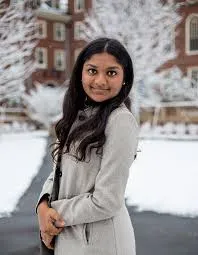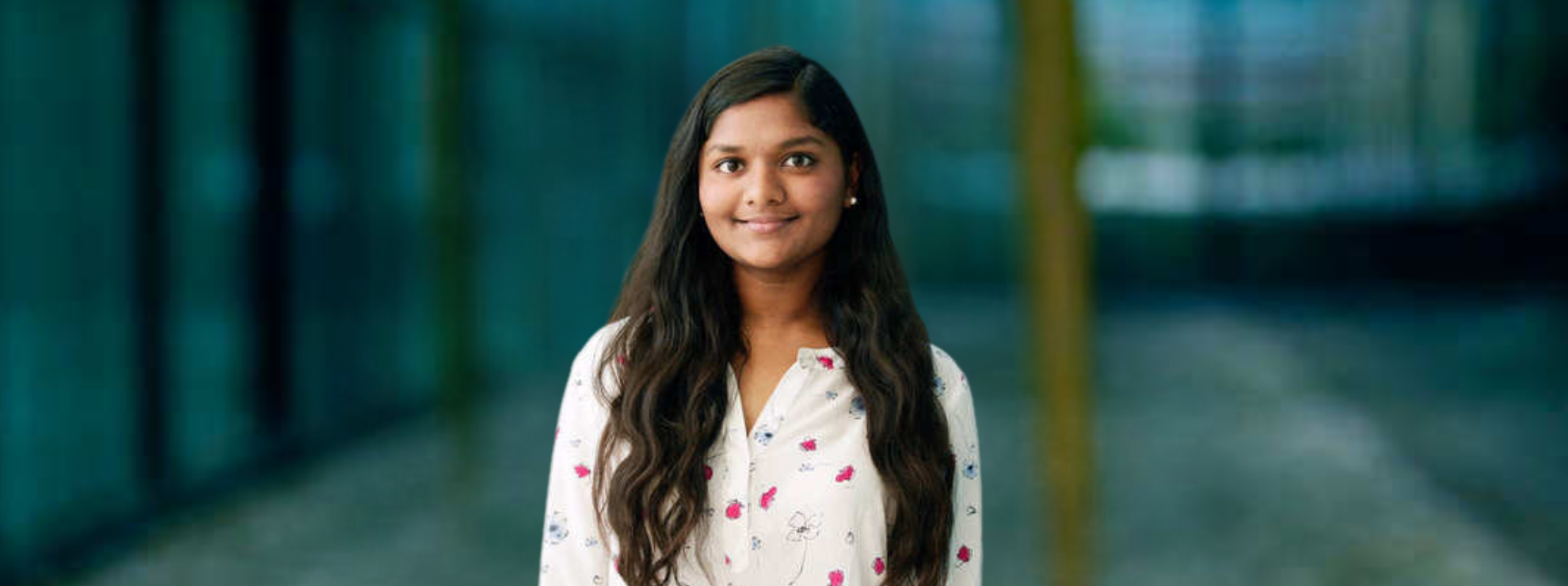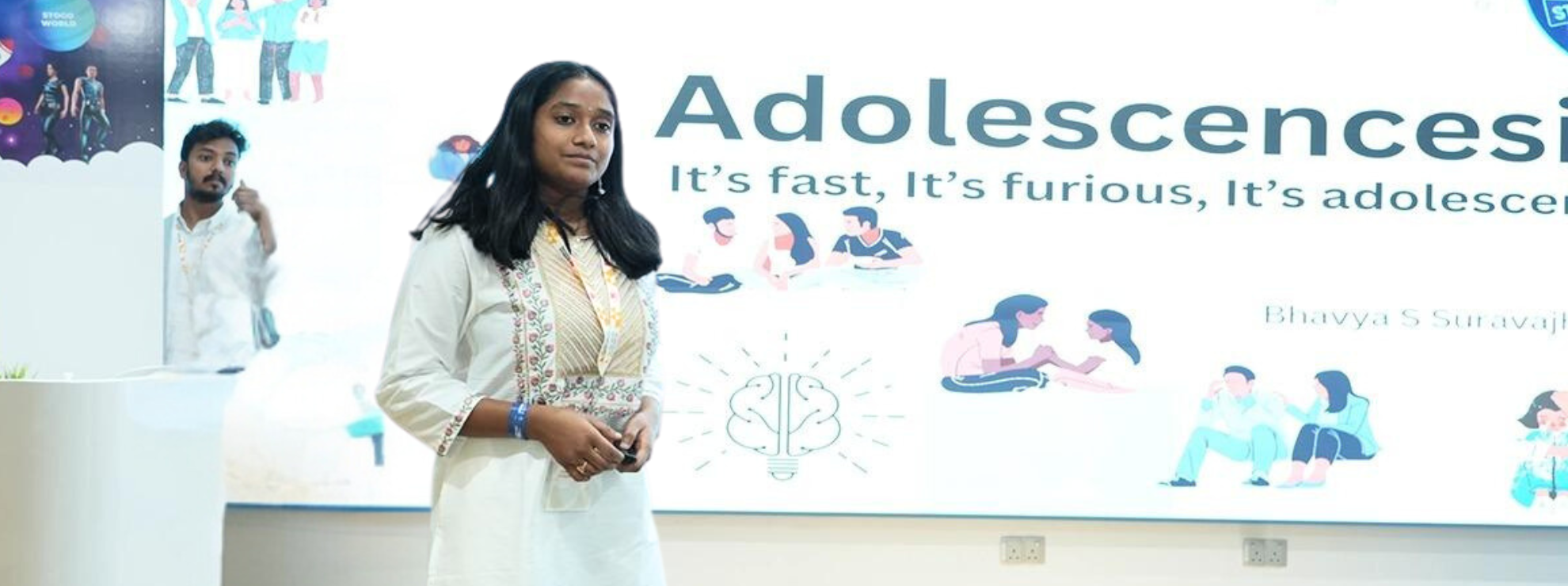(October 1, 2024) “Find out what you care about and then see what questions you can ask about it.” Rhodes scholar Swathi Srinivasan is a great believer in pursuing the things one is truly passionate about – that’s why she’s able to put so much on her plate. She had a patent by the time she finished high school, did a double major at Harvard University and was selected as a Rhodes Scholar 2021. Swathi also has a slew of recognition to her credit – she is a 2016 Melvyn Scholar, a Science Day alumna and an AJAS scholar too. Ever since she began her research work in high school, Swathi has gone on to work for UNAIDS in Geneva to understand the work being done to address HIV at an international level. She is part of the policy programme at the Harvard Kennedy School and has travelled the world for research on global healthcare for HIV/ AIDS, the opioid crisis and the Covid-19 pandemic and has also worked with the government of Massachusetts.
Swathi was raised in an exceptionally well-educated and accomplished household. Her mother, Rekha, arrived in the US over two decades ago, after her wedding to Swathi’s dad. She earned a PhD in the US and began teaching organic chemistry. Rekha is also a Fulbright scholar – in 2019 and 2020, she came to India and Nepal to offer STEM workshops across the two countries. Swathi’s dad, a biomedical engineer, is credited with creating an improved incubator, among other paediatric devices.

Rhodes scholar Swathi Srinivasan
Battling the emperor of maladies
It’s the sort of atmosphere, one imagines, that would have given the young Swathi a leg-up like no other. The accomplished Rhodes scholar, however, has faced more than her fair share of challenges. In late 2019, she was diagnosed with Hodgkin’s lymphoma, a fairly aggressive cancer that attacks the lymph nodes and immune system. “I would ride my bike to chemotherapy everyday,” she says, recalling her daily six-mile trip to the Dana-Farber Cancer Institute in Boston. She would ride in sunshine, rain and snow, despite having lost her hair. She managed all this without missing a single class.
Instead of lamenting her lot in life, Swathi used even this time to ponder the struggles of global healthcare, especially among the marginalised. “I was thinking of the side effects of chemotherapy, which is a really big issue too and matter differently to different people. I’m in school, I can take a day off when I feel nauseous but a single parent can’t do that, can they? They have to show up at work no matter what.” She could ride her bike to the hospital but wondered “how other people do it, if they live further away from the hospital and don’t have a car. I was back to the question of inequality and this time around, I was a lot more connected to it.” It inspired her to go back to the lab, to work on a form of chemotherapy that reduces side effects.
A low-cost incubator
Growing up, Swathi was always encouraged to pursue her interests, which were quite varied. When she wanted to be a fashion designer, her mom bought her a sewing machine. When she wanted to make jewellery, her mother helped her buy gemstones online. If she wanted to conduct an experiment, her mother would bring home the ingredients she needed. As for Swathi, she gives full credit to her parents and her mentors and its eager, she says, “to pay it forward.” Her mother would take her to the lab when she was still a toddler and she had observed her father working. And when she still in high school, she had devised her own incubator.
“I burnt my hand on a resistor in the Physics lab one day,” Swathi said. “And I was like, this device is pretty cool. So I created a grid of resistors and made a heating pad.” She was inspired by her father’s work but the incubators he created were very expensive, Swathi wanted accessibility. She discovered the MIT Think initiative for high school students and applied, even though she wasn’t affiliated with a lab at the time. “I had no mentors or a lab to support me but I needed the money and said so. They said ‘sure’,” she recalls. “They brought me to MIT and I met all these crazy scientists doing amazing work. I even met a scientist I had cited in my bibliography.” Her prototype involves a secondary heating mechanism embedded into a gel-based incubator, which keeps the gel hot for more than 30 hours.


Harvard calling
Unsurprisingly, Swathi graduated from high school and went to Harvard University with stars in her eyes, intent on becoming a neurosurgeon, with a special interest in the prevalence and treatment of Alzheimer’s Disease. As she sat in class, she wondered – say there was a breakthrough in a cure. Would everyone with the disease have access to treatment? The answer was simple: no. Swathi found herself more intrigued by this question than the one she had intended to ask in the laboratory. She switched her major to public health, studying a double major in Economics, Sociology, Philosophy and History.
Here, Swathi’s focus remained on studying public health epidemics and her thesis was on the impact of inequality on HIV/AIDS and the Covid-19 pandemic. She also did a minor in chemistry, which she uses to formulate her chemotherapy research. She was in an atmosphere where her talent and academic rigour were matched by her peers. “Some of my peers were featured in Forbes 30 Under 30,” Swathi remarked. “They have published multiple papers, were ballet dancers in national companies… this naturally gets in your head and requires some adjusting.”
The Rhodes scholarship
A highly-rigorous selection process precedes the Rhodes scholarship. For Swathi, it involved eight letters of recommendation and a letter of endorsement from her university, which put her against 125 applicants. Harvard selected 45 and she was among them, going on to become one of the 32 scholars selected from the United States. Every year, 100 students are selected to join the world’s academic elite at Oxford Universiy, as the Rhodes Scholars for the year. In her personal essay, she talked about her own life and her roots, and how she saw poverty in India. “I actually woke up one morning and it showed up on my Facebook feed on US News, Yahoo and AP,” she said in an interview.
Now at Oxford University, the Global Indian‘s purpose has not changed, she lives by the same lessons she earned from hermother. “We have gotten to where we are because so many people have lifted us up,” she said. “Therefore, it’s our job to lift up others.”
- Follow Swathi, a Rhodes scholar on LinkedIn




